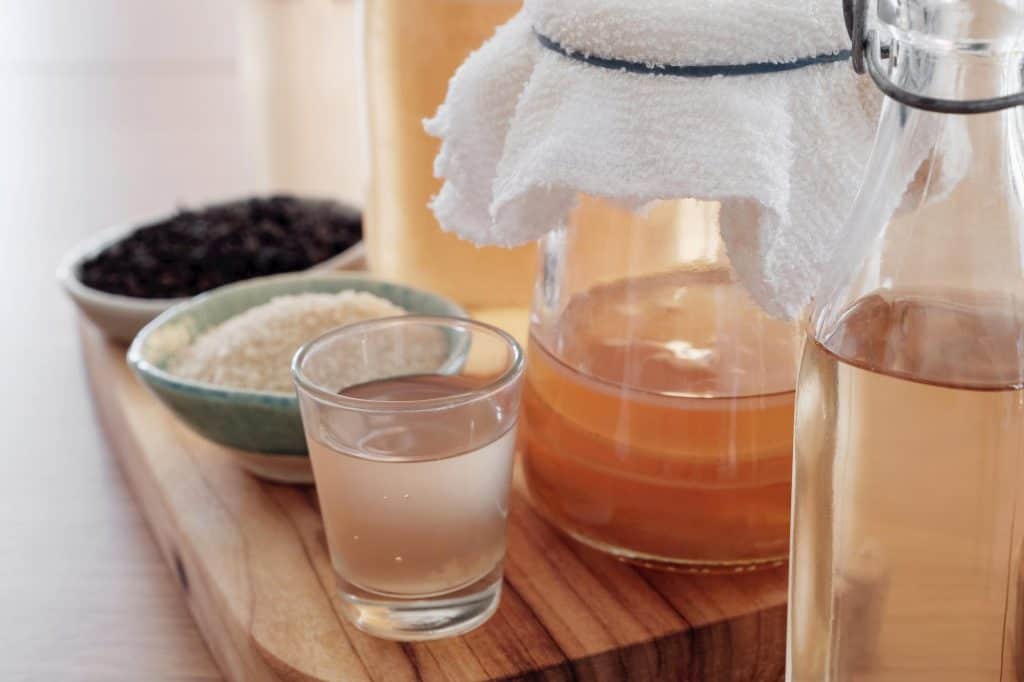
Kombucha is a tea-based beverage that is slightly alcoholic. It is fermented and releases carbon dioxide during the process of fermentation which causes the drink to be effervescent.
More often than not, kombucha is prepared using black tea or green tea and a sweetener is added. The sweetener could be any type of sugar. The only thing is that it must allow the SCOBY to develop.
Why you need sugar for brewing Kombucha
SCOBY is mainly made of yeast and therefore, sugar is necessary to allow the yeast to thrive. Yeast converts the sugar into alcohol and carbon dioxide. You can use any of the different sugar molecules like glucose, fructose, lactose, dextrose, sucrose and these provide nutrition to the yeast.
Out of all the sugar molecules, sucrose is most easily digested by yeast, leading to the release of carbon dioxide and ethanol. Sugar is, therefore, the essential ingredient in the fermentation process involved in brewing kombucha.
Types of sugar you can use for Kombucha
There are many different types of sugar available and each adds a different flavor to your kombucha.
You should choose the type of sugar you want to use carefully. The sugar will not only affect the flavor of the kombucha but also the time it takes to brew.
Raw or cane sugar
Raw or cane sugar is unprocessed or at least less processed than other types of sugar. Most nutrients like iron, magnesium, potassium, and calcium are available in raw or cane sugar. Kombucha does not need any of these nutrients to develop a rich flavor but these do make the beverage rather healthy.
Raw sugar also consists of molasses that refined sugar does not have. This means that raw sugar retains its natural state as much as possible.
To make sugar, which is most unrefined or unprocessed, very low heat is applied to the sugar cane juice. The juice is constantly stirred, slowly, with a paddle. It takes a very long time to develop sugar and takes a lot of effort. This is why raw sugar or cane sugar is very expensive.
Molasses
The addition of molasses darkens the color of the sugar. This, however, does not affect the taste of the kombucha. What affects the taste of the kombucha is that the addition of molasses increases the non-sucrose contents of the kombucha.
If there are too many non-sucrose elements in the kombucha, the brewing time will increase. The non-sucrose elements add a complexity of flavors in the kombucha and make it taste even more delicious. Molasses can be of three types: light molasses, dark molasses, and blackstrap molasses.
Light molasses is very sweet and the process is a very quick one. The sucrose content is very high. Dark molasses are created from the second boil. It is very rich in minerals and vitamins.
Dark molasses also adds a very strong flavor to the kombucha. However, blackstrap molasses is the richest in flavor. It is obtained from the third boil of the sugar which separates the molasses from the crystals of the sugar.
Honey
Raw honey is not ideal for kombucha. Raw honey has certain enzymes that metabolize to form hydrogen peroxide.
Raw honey also contains yeasts that cause harm to the SCOBY, interfering with the process of development. Normal honey can be used in your kombucha and it gives both health benefits and flavor to the kombucha. But make sure, you use pasteurized honey.
Maple syrup
Maple syrup is obtained when the sap of the maple tree is concentrated. It has zinc and manganese which is passed on to the kombucha, thus raising the mineral content of the beverage.
However, you should use unprocessed maple syrup. Many of the maple syrups available in the market contain corn syrup. You should avoid such syrups.
The best sugar for Kombucha
You will find many different kinds of sugars in the market. While each of these sugars will have a distinct flavor and might be of very high quality, they might not be perfect for your kombucha.
Given below are two of the sugars that we recommend. Both these sugars will improve the taste of your kombucha and you can choose whichever suits your needs best.
Anthony’s Organic Cane Sugar
There is nothing better than some delicious sugar to add a rich flavor to your kombucha. Anthony’s organic cane sugar is great for kombucha and can be used as a sweetener in any dish that needs a bit of sugar.
Certified by the USDA, this cane sugar is quite pure and has a natural blonde color.
Pros
- The sugar is GMO-free and a hundred percent organic.
- It is also gluten-free and therefore, you can use it to bake cakes and pies or brew beverages.
- The sugar is completely organic contains no harmful chemicals, additives or even preservatives. There are also no artificial dyes added.
- The sugar dissolves very easily in warm beverages.
- The sugar has a lovely flavor and an equally good fragrance.
Cons
- The condition of the packaging might be dated upon shipping. Check the bag carefully before using the sugar.
- This sugar is more expensive than other similar products in the market.
- You will not find the distinct taste of molasses in this sugar. It is rather mild.
365 Everyday Value Organic Cane Sugar
Good quality sugar can improve the taste of your kombucha immensely. Organic cane sugar by 365 Everyday Value is completely natural and quite healthy as well.
The sugar is also certified kosher. You will find that the sugar is light beige and has a coarse texture. You might also find that it is sweeter than white sugar.
Pros
- The sugar is vegan and therefore it is free of any bleaching products like bone char.
- This sugar is certified GMO-free.
- The sugar is very flavorful and it dissolves almost immediately after being added to a beverage at room temperature or when it is used for cooking.
- 365 Everyday Value packs the sugar is resealable packages that keep it fresh for a long time.
Cons
- If left unused for a long time, the sugar might turn into hard lumps which will be very difficult to use.
- The sugar will not dissolve easily when added to iced beverages.
Conclusion
Choose the sugar for your kombucha carefully as it will affect how your kombucha will turn out. If you want a light kombucha then choose a sugarless in molasses content. But if you want a rich kombucha then use dark molasses or raw sugar that will add to the flavor profile.



Leave a Reply